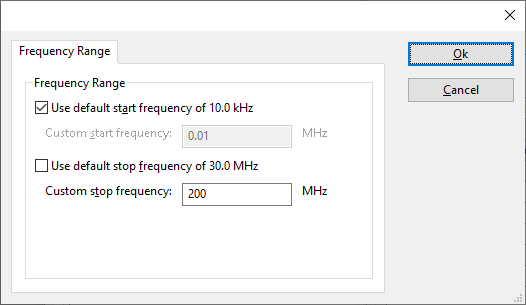PMM 9010: Difference between revisions
(Updated DeviceDriverInfo template) |
No edit summary |
||
| Line 5: | Line 5: | ||
|DeviceType=9010 | |DeviceType=9010 | ||
|SupportedDeviceTypes=512 | |SupportedDeviceTypes=512 | ||
}}The [[PMM]] 9010 [[Spectrum analyzer]] can be controlled over [[USB]] or [[GPIB]]. | |HideAutoData=1 | ||
}} | |||
The [[PMM]] 9010 [[Spectrum analyzer]] can be controlled over [[USB]] or [[GPIB]]. | |||
If the device is to be controlled over USB, the USB <=> Serial port drivers as provided by [[PMM]] has to be installed first. | If the device is to be controlled over USB, the USB <=> Serial port drivers as provided by [[PMM]] has to be installed first. | ||
This device driver allows that multiple traces are measured simultaneously. This is only possible in the PMM 9010 'Sweep' mode. In this 'Sweep' mode, it is however necessary to always use auto attenation. It is not possible to use a fixed attenuation. PMM responded with: | |||
{{Quote|We confirm that command “SSFD” doesn’t affect Attenuators’ settings, as we simply didn’t design it to be changed by remote control, which would have meant accessing up to 4 menus in Manual Mode. Therefore we’ll define forcing Attenuators’ settings in AUTO mode starting from the next FW release, as that’s the only mode we intend to support.}} | |||
Revision as of 13:06, 16 February 2011
The PMM 9010 device driver is a Spectrum Analyser which is supported by RadiMation®.
Configuration[edit]
The following tabs are available in the advanced configuration of the PMM 9010:
The frequency range of the PMM 9010 as provided by the manufacturer is shown and selected as default. It is possible to overrule these frequencies and to manual adjust the allowed frequency range of the PMM 9010.
| If the checkbox is checked, the default start frequency will be used as the lowest usable frequency in a test for this device. |
| If the Use default start frequency checkbox is unchecked, another start frequency (expressed in MHz) can be specified. The customized start frequency will then be used as the lowest usable frequency in a test for this device. The customized frequency can be a limitation or an extension of the default start frequency. |
| If the checkbox is checked, the default stop frequency will be used as the highest usable frequency in a test for this device. |
| If the Use default stop frequency checkbox is unchecked, another stop frequency (expressed in MHz) can be specified. The customized stop frequency will then be used as the highest usable frequency in a test for this device. The customized frequency can be a limitation or an extension of the default stop frequency. |
Specifying a different frequency range can be useful if for example:
- A device (like a coupler, antenna, injection device, cable, etc...) is still useable (but out of specification) outside the standard suggested frequency range.
- An external mixer is used to measure an extended frequency range.
- An up- or down-convertor is used to shift the frequency range.
- A newer model of a device is present that has an extended frequency range, and still uses the same remote control commands.
Be careful changing these setting as RadiMation® is no longer able to verify if the PMM 9010 is used outside frequency range that is specified by the manufacturer. This may result to serious damage of your measurement device.
The PMM 9010 Spectrum analyzer can be controlled over USB or GPIB. If the device is to be controlled over USB, the USB <=> Serial port drivers as provided by PMM has to be installed first.
This device driver allows that multiple traces are measured simultaneously. This is only possible in the PMM 9010 'Sweep' mode. In this 'Sweep' mode, it is however necessary to always use auto attenation. It is not possible to use a fixed attenuation. PMM responded with:
| “ | {{{text}}} | ” |
